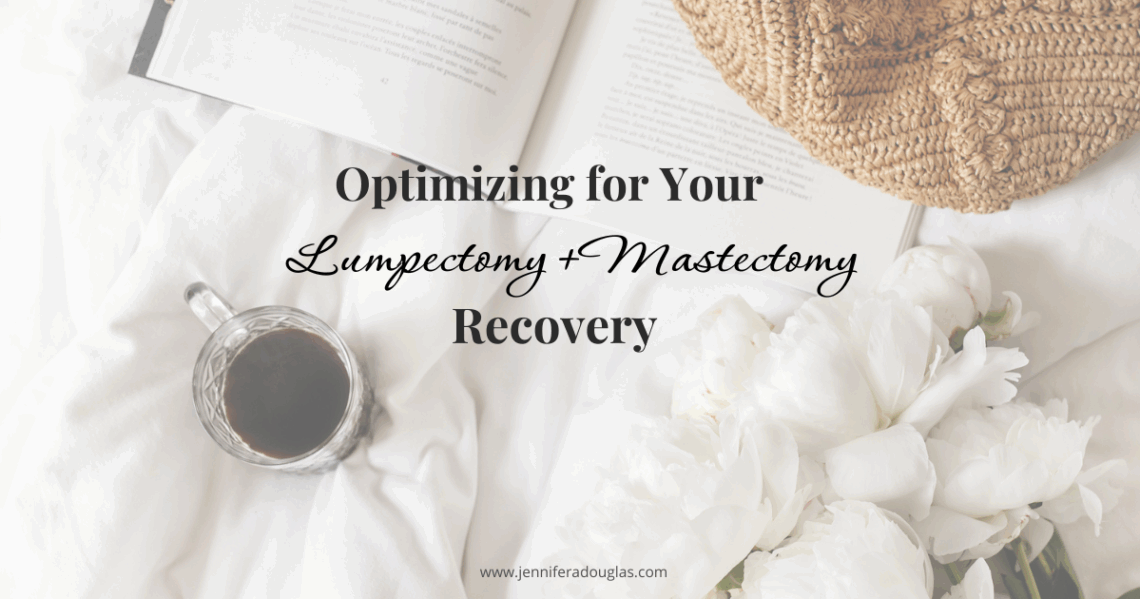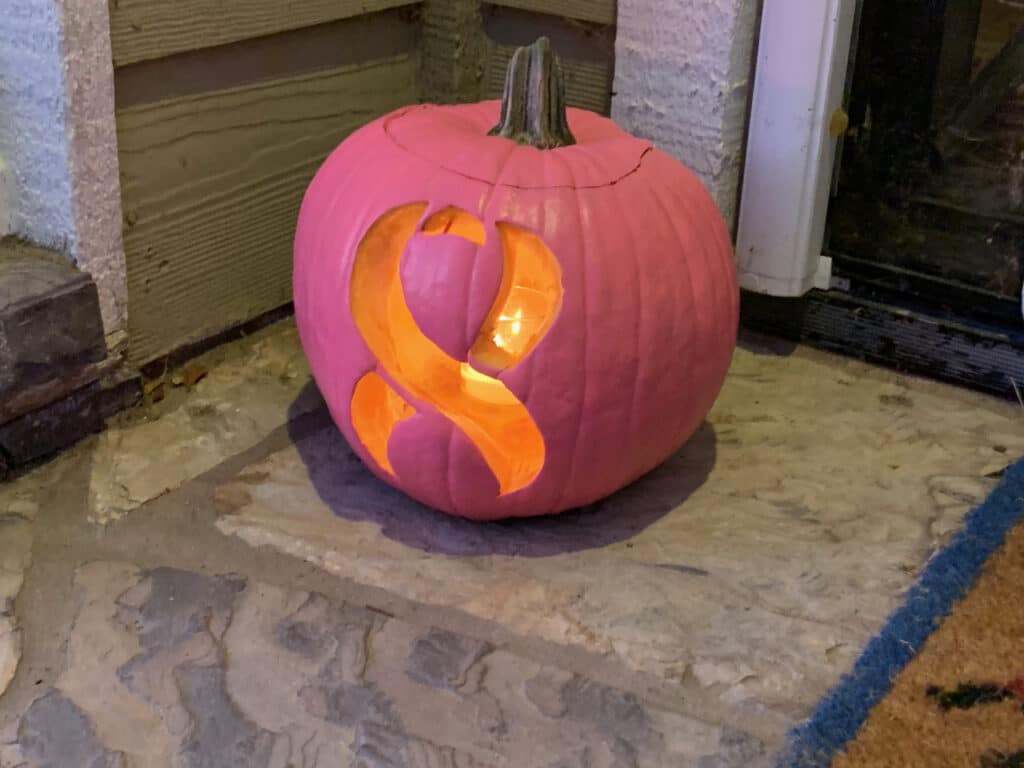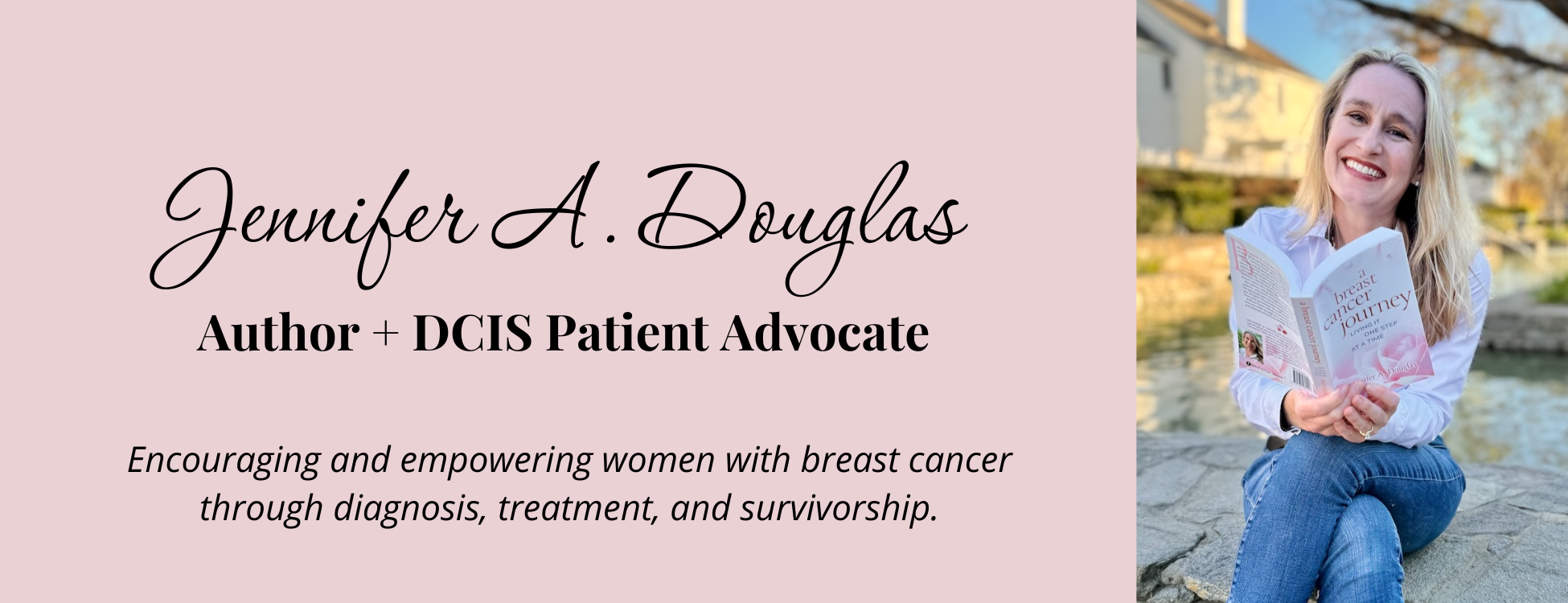
Optimizing Home Life for Your Lumpectomy or Mastectomy Recovery
Before my lumpectomy, I took time to optimize my home life for a smooth recovery. I thought about my normal responsibilities and made some plans so that they would be taken care of. Preparing for a lumpectomy or a mastectomy can involve much more than medical planning. We also need to think about all the other areas of our lives that may be impacted.
There were some unexpected problems during my recovery, but that seems to be what it is like to face a major medical challenge. We do the best we can to prepare, and then we adjust.
Personal Care:
I was very clear that I wanted my husband, Dave, to be the one to help me do my personal care. I needed someone I was comfortable with to help me get clean and manage my surgical wounds.
Please take some time before surgery to think about who you might want to help you get clean. Whether you have a mastectomy or a lumpectomy, you’ll need help. If you don’t have a spouse who can help you or are not comfortable with your spouse helping, then perhaps you have a relative or a friend who you could call.
Also, I would highly recommend that you schedule one professional shampoo a few days after your surgery. I was thrilled to get my hair washed and fluffed by my hairdresser. I wasn’t able to shower for over a week after my surgery, and that was going to be too long without a hair washing!
Personal Care Tasks:
- Getting up out of bed safely
- Using the restroom
- Wiping
- Getting Clean
- Getting dressed
- Managing the surgical drains
- Managing medication
- Emotions
- Transportation to and from appointments
Children:
If you have children living at home, another aspect of recovery preparation will be planning for their care. Our kids were in high school at the time, so preparation looked different for our family. There are two aspects of preparation that I’ll address here. One is surgery day, and the other is recovery.
Surgery Day: Think in advance about who will take care of your kids during your surgery.
My kids were old enough to stay home alone during my surgery. We don’t have family that lives in town, and the surgery was going to be at a hospital located out of our city. Dave wouldn’t be able to come home while my surgery was taking place.
I really didn’t want the kids to be home alone while I was in surgery. I wanted them to have someone to talk to if they were struggling with emotions or needed help. We asked our friends who lived down the street if the boys could come over when they were done with school for the day.
That worked really well. Our friends planned a lovely day for them. Since my surgery was close to Halloween, one of the activities was to carve pumpkins. They carved a pink ribbon pumpkin for me. It brought a smile to my face!

I was so thrilled to know that they would not be alone while I was in surgery. Even though they were old enough to be alone, I didn’t feel good about them dealing with their mom in surgery by themselves.
If your kids are younger, think about who you might call to care for them during your surgery. This might be a great opportunity for a grandparent to step in and be able to help you out. Another idea might be a trusted friend or babysitter. If your children are little, it might be easier for them to stay home and have the caregiver come to your house. Or, if you think you’d like a little space to recover before you see the kids, perhaps they could spend the night somewhere.
Recovery: Another thing to think about is who will be taking care of the children during your recovery. If you have a partner living at home, then that would be an easy choice. If you are a single parent, then it might look different for you. You might need to ask friends or family to help out.
Dave took time off of work to care for me during the surgical recovery. He also stepped in to teach the boys and manage the virtual schooling. He provided a nice buffer for me so that I didn’t need to deal with the everyday challenges of parenting. This allowed me to focus on recovery.
Parenting tasks you might need to outsource:
- Transportation
- Diapering
- Bedtime rituals
- Bathing
- Homework or school help
- Attending events
- Discipline
- Lifting or carrying
- Meal Preparation or feeding
You may feel good enough to do some things a few days after surgery, but I would highly recommend that you plan for extra help. Surgical recovery isn’t always smooth. Planning ahead will help you keep the routines going as much as possible for your children.
Pet Care:
I have two wonderful beagles who are a joy to own. They also like to jump up on me, sleep on my bed, and bark outside. Dave and I walk them at least once a day, but they are still full of energy. As we approached my surgery, I decided to ask our dog sitter if she would be willing to take the dogs for several days. I wasn’t sure how I would be doing after the surgery, and I also didn’t know how the family would do while I was in recovery.
I had concerns about the dogs jumping up and disturbing my surgery site or pulling out a surgical drain. I was also concerned that their barking would disrupt my sleeping. I thought that I might be napping more during the day, and they like to bark at all the neighborhood noises.

I am so glad that we had the dogs taken care of during my first few recovery days. Dave and I were able to sleep in that first morning after surgery. He was able to focus on doing the homemaking and school supervision tasks rather than chasing the dogs. This buffer allowed our home to transition into a recovery mode.
When the dogs returned, I was much more able to manage them. I didn’t walk them for quite a while after surgery, but I felt good enough to have them around.
Pet care tasks you might need help with:
- Feeding
- Walking
- Bark management
- Poop clean up
- Supervision
If you have pets in your home, I would encourage you to take some time before your surgery to think about how you might plan for their care. Perhaps you have a neighbor who could walk them for you. If you have a cat, how will you plan for the litter changing? Taking a little time before your surgery will allow you to focus on your physical recovery more fully.
Home Management:
There are household tasks that need to get done whether or not we are feeling good enough to do them. In our home, I usually take on the homemaking chores. But, I would be in recovery, so that meant that I wouldn’t be doing them. However, the family still needs to eat, even when we are in surgical recovery.
It was tough for me to let go of the homemaking tasks. I have been doing them my way for twenty years. During my recovery, Dave and the boys did them.
The first thing I learned was that I needed to let them figure it out. They were going to do things their own way. On the first day of my recovery, the coffee pot overflowed. Dave managed to salvage the coffee for me and then brewed another pot. Then he went to town cleaning the coffee pot.
Except, he got the electronics too wet, and the coffeemaker screen stopped working.
This was the first day of my recovery, and the coffeepot was broken. What was I going to do? I had two options. Yell at him, or let him solve the problem.
I might have done a little of both.
Dave solved the problem by completely reinventing our daily coffee system. We now have a coffeepot that has no electronics and is hooked up to a smart plug. We tell our HomePod to turn the coffee on, and then it turns the plug on. It is perfect.
I would never have thought that our daily coffee would get better because Dave reinvented it.
So, my first piece of advice, and the most important, is to let go of your expectations. Allow your family or friends to help out with the home tasks. It won’t look the same because you aren’t doing it. But that is ok. Maybe things will get better- just like my morning coffee.
Home tasks you might need to outsource:
- Dishes
- Cooking
- Laundry
- Cleaning
- Gardening
- Errands
Recovery Location:
I spent time discussing with the family where I should spend most of my time recovering from surgery. We have been a virtual school family for many years, so one of the biggest changes to our family would be the change in school supervision. Dave was going to be taking over the virtual school supervision. He has done this on occasion, but never on a full-time basis. This was going to be a real difference for our family.
We decided that it would be best for me to recover upstairs in my bedroom. I would be separated from the homeschool, and it would be harder for me to jump in and start working. This would also make it difficult for the boys to come to ask me a question.
I set up my bed as my primary recovery location. I had a well-stocked nightstand and an iPad to keep me from getting too bored. I had some of the flowers arranged in the room which people had sent me for well wishes. Looking at them brought a smile to my face.

We brought in a chair so that when I had visitors, they could visit with me in comfort. This worked great because I could have a visitor without interrupting the virtual schooling.
I would come downstairs to eat meals and also to enjoy some family time after school was done.
It may be that the bedroom isn’t the right place for you to recover. I have spoken with many ladies who have used a recliner as their primary recovery location. Some even like to sleep in it.
Wherever you recover, I hope you can create a comfortable and pretty space to support you in your healing. It can be challenging to let go of the responsibilities that we are used to taking on. But, it is so important that we focus on our recovery right after surgery. I hope that these ideas help you optimize your home life for your lumpectomy or mastectomy recovery.
Jennifer Douglas
Jennifer Douglas is an author, patient advocate, and DCIS breast cancer survivor. After navigating her own breast cancer journey in 2019, she began writing and encouraging others who were newly diagnosed. Her resources include her book, "A Breast Cancer Journey: Living It One Step at a Time," and her online support course, "Encourage: Breast Cancer and Beyond." Jennifer also actively supports patients through her online presence and direct involvement in communities and support groups, offering guidance and encouragement every step of the way.


You May Also Like

A Cancer Diagnosis is Shocking- It is Okay to Have Strong Feelings
September 14, 2021
Get Your Mammogram- Regular Screenings Reduce Risk
June 12, 2020
